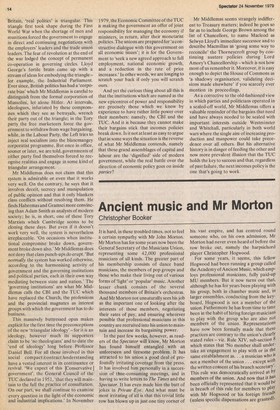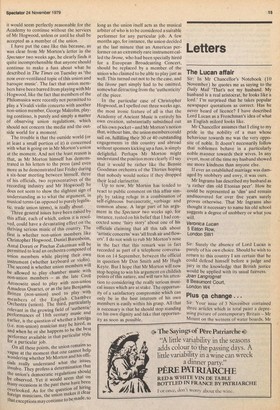Ancient music and Mr Morton
Christopher Booker
It is hard, in these troubled times, not to feel a certain sympathy with Mr John Morton. Mr Morton has for some years now been the General Secretary of the Musicians Union, representing some 42,000 professional musicians of all kinds. The greater part of his membership consists of dance band musicians, the members of pop groups and those who make their living out of various forms of 'light' or 'popular' music. Another lesser chunk consists of the several thousand members of Britain's orchestras. And Mr Morton not unnaturally sees his job as the important one of looking after the interests of those members, negotiating their rates of pay, and ensuring wherever possible that professional musicians in this country are recruited into his union to maintain and increase its bargaining power.
In the past few weeks, however, as readers of the Spectator will know, Mr Morton has found himself entangled with an unforeseen and tiresome problem. It has attracted to his union a good deal of profoundly irritating coverage from the press. It has involved him personally in a succession of thne-consuming meetings, and in having to write letters to The Times and the Spectator. It has even made him the butt of jokes in Private Eye. And what must be most irritating of all is that this trivial little row has blown up in just one tiny corner of his vast empire, and has centred round someone who, on his own admission, Mr Morton had never even heard of before the row broke out, namely the harpsichord player Christopher Hogwood.
For some years, it sqems, this fellow Hogwood had been running a group called the Academy of Ancient Music, which employs professional musicians, fully paid-up MU members. But it now turns out that, although he has for years been playing with his group, both in chamber music and, iii larger ensembles, conducting from the keyboard, Hogwood is not a member of the union. Futhermore he has from time to time been in the habit of hiring foreign musicians to play with the group who are also not members of the union. Representations have now been formally made that these practices are contrary to the union's clearlY stated rules — viz. Rule XIV, sub-section 8 which states that 'No member shall undertake an engagement to play with or in the same establishment as. . a musician who Is not a member of the union . . . except with the written consent of his branch secretary This rule was democratically arrived at bY members of the union. And now that it has been officially represented that it would be in breach of this rule for members to WY with Mr Hogwood or his foreign friends (unless specific dispensations are granted), it would seem perfectly reasonable for the Academy to continue without the services of Mr Hogwood, unless or until he shall be accepted as a member of the union.
I have put the case like this because, as was clear from Mr Morton's letter in the Spectator two weeks ago, he clearly finds it quite incomprehensible that anyone should continue to make a fuss about what he described in The Times on Tuesday as 'the now over-ventilated topic of this union and baroque music'. The fact that union members have been barred from playing with Mr Hogwood, like the fact that members of the Philonausica were recently not permitted to play a Vivaldi violin concerto with another non-union member, George Malcolm, playing continuo, is purely and simply a matter of observing union regulations, which should not concern the media and the outside world for a moment.
The trouble is that the outside world (or at least a small portion of it) is concerned with what is going on in Mr Morton's union at the moment. And not the least reason is that, as Mr Morton himself has demonstrated in his letters to the press (and even more as he demonstrated last Friday during a six-hour meeting between himself, three of his officials, two representatives of the recording industry and Mr Hogwood) he does not seem to show the slightest sign of understanding as to what the argument, in musical terms (as opposed to purely legalistic, trade union terms), is really about. Three general issues have been raised by this affair, each of which, unless it is resolved, could have a devastating effect on the thriving serious music of this country. The first is whether non-union members like Christopher Hogwood, Daniel Barenboim, Antal Dorati or Pinchas Zukerman will be permitted to lead an orchestra composed of union members while playing their own instrument (whether keyboard or violin). The second is whether union members will be allowed to play chamber music with non-union members — as the late Cecil Aronowitz used to play with non-union Amadeus Quartet, or as the late Benjamin Britten (non-union) used to play with members of the English Chamber Orchestra (union). The third, particularly relevant in the growing field of 'authentic' performances of 18th century music and earlier, is the question of whether a foreign (i.e. non-union) musician may be hired, as and when he or she happens to be the best Performer available in that particular style for a particular job. On all these points, the union remains so vague at the moment that one cannot help Wondering whether Mr Morton and his officials really understand what the issues involve. They profess a determination that the union's democratic regulations should be observed. Yet it would seem that on InanY occasions in the past these have been overlooked. As for the question of hiring foreign musicians, the union makes it clear that exceptions may continue to be made, so long as the union itself acts as the musical arbiter of who is to be considered a suitable performer for any particular job. A few months ago, for instance, the union decided at the last minute that an American performer on an extremely rare instrument called the lirone, who had been specially hired for a European Broadcasting Concert, should be replaced by a member of the union who claimed to be able to play just as well. This turned out not to be the case, and the lirone part simply had to be omitted, somewhat detracting from the 'authenticity' of the piece.
In the particular case of Christopher Hogwood, as I spelled out three weeks ago, the most ironic feature of all is that the Academy of Ancient Music is entirely his own creation, substantially subsidised out of his own pocket —and Mr Morton's notion that, without him, the union members could sail on, fulfilling their 30 or 40 outstanding engagements in this country and abroad without sponsors kicking up a fuss, is simply delightful. Perhaps Mr Morton might understand the position more clearly if I say that it would be rather like the Bennie Goodman orchestra of the Thirties hoping that nobody would notice if they dropped their lead clarinettist.
Up to now, Mr Morton has tended to react to public comment on this affair simply by taking refuge in a combination of self-righteous bureaucratic verbiage and common abuse. A large part of his argument in the Spectator two weeks ago, for instance, rested on his belief that I had concocted some 'fairy story' about one of his officials claiming that all this talk about 'artistic concerns' was 'all fresh air and flowers'. I do not wish to rub Mr Morton's nose in the fact that this remark was in fact recorded as part of a telephone conversation on 14 September, between the official in question Mr Don Smith and Mr Hugh Keyte. But I hope that Mr Morton will now stop hoping to win his argument on childish points of this nature, and will turn his attention to considering the really serious musical issues which are at stake. The opportunity of a satisfactory compromise which can only be in the best interests of his own members is easily within his grasp. All that is necessary is that he should stop standing on his own dignity and take that opportunity as soon as possible.



































 Previous page
Previous page